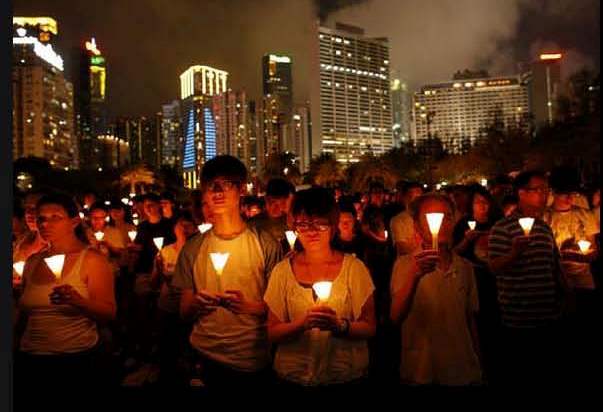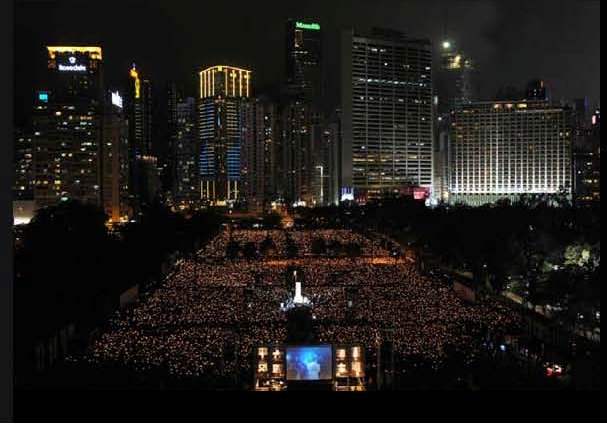Thousands Rally in Hong Kong for Human Rights
By ISABELLA STEGER in Hong Kong and PAUL MOZUR in Taiwan

Huge crowds in Hong Kong turned out to commemorate the Tiananmen Square crackdown of June 4, 1989, amid concerns that the human rights situation in China has taken a turn for the worse in the past year.
According to organizers, around 150,000 people attended the gathering at Victoria Park in Hong Kong. Local media reports say Hong Kong police, which have generally given far lower crowd estimates than those of the organizers, put the maximum number of attendees at 77,000.
Hong Kong Remembers Crackdown
Vincent Yu/Associated Press

Tens of thousands of people in Hong Kong on Saturday marked the bloody 1989 Tiananmen Square crackdown, as China defies world condemnation with an ongoing roundup of political dissidents. Video courtesy of AFP.
Attendees packed Hong Kong’s Victoria Park holding candles and singing songs in memory of those who lost their lives in the 1989 crackdown. In a sign of the issues on the minds of many attendees, vendors outside the park sold T-shirts with references to artist Ai Weiwei, an outspoken critic of the Chinese government who has been detained for more than a month, and the Jasmine Revolution—an allusion Tunisia’s revolution and to calls for political reform.
Hong Kong, a special administrative region of China with its own laws, has held a June 4 commemoration every year since 1989. Such activities are illegal on the mainland.
Lee Cheuk-yan, chairman of the Hong Kong Alliance in Support of Patriotic Democratic Movements in China, which organizes the vigil each year, said the current human rights situation in China was the “darkest” in the last 22 years, as authorities use upheaval in the Middle East to justify their heavy-handed tactics “outside of the law.”
This is the first year that the vigil was held without the leadership of Szeto Wah, a veteran of the democratic movement in Hong Kong who died this year. Mr. Lee succeeded Mr. Szeto as chairman of the Alliance after his death.
Tributes were paid by the organizers to the centenary of the Xinhai Revolution, which overturned Qing dynastic rule in China. Some Chinese nationalist flags were visible at the vigil. Ivan Chan, 30, who has attended the vigil every year, wore a shirt with the pattern of the Taiwanese red white and blue flag.
“I wear this shirt because I believe that China should be ruled according to the three democratic principles of Sun Yat-sen,” said Mr. Chan, referring to the father of China’s nationalist movement. “But I think China is moving in the complete opposite direction right now.”
One 17 year-old high school exchange student from Italy was at the vigil with three of his friends also on exchange from Europe after hearing about it from local students at his school. He said he was impressed at how “people in Hong Kong are fighting and demonstrating against the situation in China.”
Pre-recorded footage from the Tiananmen Mothers, a group of mothers of those who were killed during the 1989 protests, was also shown. Earlier this week, 127 members of the group co-signed a letter saying a security official had approached one of the mothers in February to discuss the possibility of financial compensation, without any mention of carrying out judicial investigations or accepting responsibility. The letter said that turmoil in the Middle East and other countries have stoked such fear among Chinese authorities that the human rights situation in China is the worst it has been since 1989.
Mr. Lee said that the annual vigils were attracting more and more interest from mainland visitors to Hong Kong, and that the Alliance would put more effort into targeting this group of people for support.
In Taipei’s Liberty Square, once named for former dictator Chiang Kai-Shek, but renamed in 2007 for its prominence during Taiwan’s democracy movement, more than 500 people gathered to listen to student speeches and music to commemorate the massacre. As the event came to a close, the crowd lit candles and kept a moment of silence before singing a song, “The Wound of History.”
In a statement Taiwan president Ma Ying-jeou called for the release of detained dissidents Liu Xiaobo and Ai Weiwei as a “first step” toward political reform. He said China’s “spotty track record” on human rights and democracy stood in stark contrast to its recent economic growth, isolating it from the international community and harming Chinese society.
“Taiwan’s experience in transitioning from an authoritarian state to a democracy shows that reform, while not painless, is certainly no disaster. Rather, it is a new beginning. It brings stability and progress, and builds trust in the government,” he said. “As we look back upon the June 4th incident, we urgently hope the mainland Chinese authorities will have the courage to undertake political reforms and promote the development of freedom, democracy, human rights, and rule of law.”
Wang Dan, a student leader at Tiananmen Square who is currently a professor in Taiwan, said in an emailed response he foresaw a “dark era for China in the near future.”
Mr. Wang, who was jailed detained and jailed for four years following the crackdown in Tiananmen, said that the need for the international community to “express their disagreement” with the Chinese government’s anti-democratic policies and human rights violations was becoming ever more urgent. In a highly publicized incident earlier this year, Mr. Wang was denied a visa to enter Hong Kong and pay his respects at the funeral of Mr. Szeto. He said Mr. Szeto had already achieved his primary goal, “to pass the obligation for Chinese democracy on to a younger generation.”
Lee Hoi-yau, eight, was attending the vigil for the third time with her parents. She said: “The Chinese government used their tanks to kill students. I don’t think that’s right and I don’t want them to do it again.”
Copyright 2011 Dow Jones & Company, Inc. All Rights Reserved